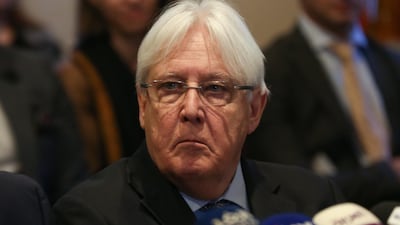Yemen's internationally recognised government blamed Houthi rebels on Wednesday for delaying efforts to conclude a prisoner exchange.
The exchange was proposed during UN-brokered peace talks in Sweden in December as a confidence building measure preliminary to an eventual political settlement to end Yemen's three-year-old civil war.
But when representatives from the two sides met on Wednesday in Jordan for the second day of talks to finalise details of the prisoner exchange, Yemeni government officials said they had opposed attempts by the rebels to change the terms of the agreement.
"We have rejected claims made by Houthi rebels to split up the list of detainees, as they have proposed for the swap to take place in different stages, with only 200 individuals being exchanged in the first stage," a Yemeni official, who is part of the delegation sent to Amman, told The National.
“We cannot allow for this to happen, all the names that we have demanded must be released,” said the official, who spoke anonymously as they were not authorised to brief the media.
United Nations envoy to Yemen Martin Griffiths and ICRC President Peter Maurer attended the first day of the talks.
The final list of the thousands of prisoners is expected to be complete on Thursday between the two sides, the UN envoy said.
"It will lay the basis for the next step which will be to see that release happening," Mr Griffiths told delegates before the start of the second round of talks in Amman in less than a month.
The UN envoy highlighted the importance of the deal as a means to achieving progress towards ending a war that has left millions on the brink of starvation.
"Success in this regard is not only of huge importance for those who will be released ... but also for the broader political process in which we have hopes the parties will together resolve the issues that divide them and return Yemen to peace,” Mr Griffiths said.
The negotiations in Jordan will allow the verification of names of around 15,000 prisoners exchanged by both sides.
The operation will be implemented by the International Committee of the Red Cross (ICRC), which says that the deal could take weeks to implement.
"Trust doesn't come from one day to another. It is a difficult process and we know this is work in progress," ICRC President Peter Maurer said at the start of the Amman talks.
During previous talks in Amman last month, the two sides swapped lists of detainees they each wanted to see freed, but mistrust has prevented them from finalising the list of names.
At the end of January, the Houthis released a captured Saudi solider and Riyadh released seven Houthi prisoners, the only detainees exchanged so far under the deal.
There are fears that the failure of these three day talks could cause the collsapse of other elements of the Swedish deal, including a truce and removal of troops from the port city of Hodeidah and the battleground city of Taez.
The ceasefire in Hodeidah remains fragile with reports of Houthi violations, but the UN says it has "largely held". The timetable for the withdrawal of forces has also fallen behind schedule.
The Sweden deal is seen as the best chance yet to end Yemen's nearly four year conflict.


